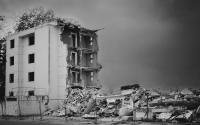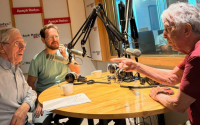22 February 2007Richard Norton-Taylor, Michael Howard
Military chiefs had been pushing for much bigger cuts in the number of British troops in Iraq than those announced yesterday by Tony Blair, defence officials made clear last night.
For months, army commanders have suggested that their presence on the streets of Basra was doing more harm than good, that it was time to lower expectations and let Iraqi forces take charge of security. They were forced to agree to a more gradual reduction partly in deference to US sensitivities. They also recognised the importance of "managing risk", a senior defence source said.
"You don't want them to have to go back in," he added.
Mr Blair confirmed yesterday that the number of British troops in southern Iraq, currently 7,100, would be reduced by 1,600 over the next few months, and by a further 500 by late summer. That would bring the number down to 5,000, with possible further cuts by the end of this year, he said. Military and defence officials make clear the aim is for all troops, bar a few instructors, to leave Iraq by the end of 2008.
It also emerged last night that troops from the Blues and Royals - including Prince Harry - would be deployed to Iraq this spring as part of a Household Cavalry detachment as 1 Mechanised Brigade replaces 19 Light Brigade, which is returning home after a six-month tour of duty. The extent of the prince's duties remains unclear, but he could be sent on frontline missions.
Mr Blair told MPs yesterday only that "the UK military presence will continue into 2008, for as long as we are wanted and have a job to do". He added: "Increasingly our role will be support and training, and our numbers will be able to reduce accordingly."
Jalal Talabani, Iraq's president, told the Guardian that while news of the withdrawal "had not come as a surprise to anyone", it was "a welcome catalyst for Iraqi security forces ... to stand on their own feet". Dick Cheney, the US vice-president, said the announcement was "an affirmation that in parts of Iraq ... things are going pretty well", while the US secretary of state, Condoleezza Rice, was keen to stress "the coalition remains intact".
Basra's civic leaders and residents expressed relief at what they saw as the first step toward the end of the difficult British presence. Hakim al-Mayyahi, a member of Basra's provincial council, said Mr Blair's statement was overdue. "Lately, they [the British troops] were not helping the stability of the security situation in Basra," he said. "On the contrary, their constant conflicts with the anti-British groups here was simply contributing to a negative impact among the public."
Salam al-Maliki, a senior official in the bloc loyal to the Shia cleric Moqtada al-Sadr, which has long opposed a foreign presence, said: "The militias and militant groups in these areas only fired their weapons at the occupier and when they go, all of the violence here will end."
Though some expressed trepidation at the potential negative consequences of a drawdown in British forces before their Iraqi counterparts were fully ready to take responsibility for security, one senior provincial official in Basra said: "If after four years they can't withdraw 1,600 troops without destabilising the situation, then God help us."
In the Commons, Mr Blair said an unconditional timetable for withdrawal "would be absolutely disastrous".
David Cameron, the Tory leader, supported the pullout, though he painted a less positive picture of the position in Basra, saying the security situation had "deteriorated dramatically over the last three years". Sir Menzies Campbell, the Liberal Democrat leader, said: "The unpalatable truth is that we will leave behind a country on the brink of civil war, in which reconstruction has stalled and corruption is endemic".
Meanwhile the MoD said last night that a Royal Marine from 45 Commando was killed when he stepped on an anti-personnel mine in southern Afghanistan.
State of the coalition
Albania 120 non-combat troops, mainly patrolling airport in Mosul; no plans to withdraw
Armenia 46 soldiers, serving as medics, engineers and drivers under Polish command; staying to end of 2007
Australia Around 550 troops training security forces in southern Iraq
Azerbaijan 150 troops; no plans to withdraw
Bosnia-Herzegovina 36 soldiers
Bulgaria 155 in total 120 non-combat troops guarding refugee camp near Baghdad, 35 support personnel
Czech Republic 99 troops
Denmark 460 troops patrolling Basra; to be withdrawn by August
El Salvador 380 soldiers in Hillah; no immediate plans to withdraw
Estonia 35 troops under US command in the Baghdad area
Georgia 900 combat, medical and support personnel under US command in Baqouba; no plans to withdraw or reduce contingent
Kazakhstan 27 military engineers; no plans to withdraw
Latvia 125 troops under Polish command in Diwaniya
Lithuania 60 troops, part of a Danish battalion near Basra
Macedonia 40 troops in Taji
Moldova 11 bomb-defusing experts returned home at end of January
Mongolia 160 troops; no plans to withdraw
Netherlands 15 soldiers as part of Nato mission training police, army officers; no plans to withdraw
Poland 900 non-combat troops; commands multinational force; mission extended to end of 2007
Romania about 600 troops, most serving under UK command; prime minister Calin Popescu-Tariceanu wants them withdrawn
Slovenia 4 instructors training Iraqi security forces
South Korea 2,300 troops in Irbil; plans to bring home 1,100; parliament insists on complete withdrawal by end of 2007
http://www.guardian.co.uk/guardianpolitics/story/0,,2018279,00.html






